Prep: 15 mins
Cook: 20 mins
Total: 35 mins
Servings: 4 servings
Yield: 6 cups
Orecchiette with sausage and broccoli rabe is originally from Puglia, the heel of the boot that is Italy. In it, orecchiette pasta (“little ears” in Italian) act like little catcher’s mitts that hold onto the chunky Italian sausage and broccoli rabe sauce. Dried orecchiette are available at well stocked grocery stores and Italian markets. Use another small cup-shaped pasta like cavatelli or conchiglie (medium shells) if you can’t find orecchiette.
What is Broccoli Rabe?
Broccoli rabe (aka broccoli raab or rapini) is a bitter green more closely related to turnips than broccoli. It looks a bit like a leggy, leafy version of broccoli, but it has a bracing bitterness that adds a lovely zest to pasta dishes.
Choose bunches that have dark leafy greens with no yellowing and thin stalks (no thicker than a pencil) for the best texture and flavor. To tame some of the bitterness, blanch the rabe in boiling water, as in this recipe, before adding it to dishes. If you can’t find rabe, substitute broccoli, broccolini, or young turnip greens and proceed with the recipe as directed.
To balance the bitterness of the rabe here, it is paired with browned sweet Italian sausage and shallots. A pinch of red chile flakes will spice the dish up, but it’s optional.
Don't Toss the Pasta Water!
Because the dish doesn’t contain tomatoes or cream, some of the water used to cook the rabe and pasta is used to moisten the dish. Place a measuring cup next to the colander to remind yourself to save some cooking water before you drain the cooked pasta!
The dish is finished with freshly grated Pecorino Romano cheese, which adds a nutty, salty touch; use Parmigiano Reggiano, if you prefer. Serve immediately, the pasta will continue to drink up the sauce as the dish stands.
“This orecchiette, broccoli rabe, and sausage was a simple yet elegant Italian-style meal you can make and enjoy any evening. Broccoli rabe, on its own, can be somewhat bitter, but cooking and combining it with pasta and cheese mellows it nicely. Add some crusty Italian bread and a tossed salad for a satisfying, well-balanced meal.” —Diana Rattray
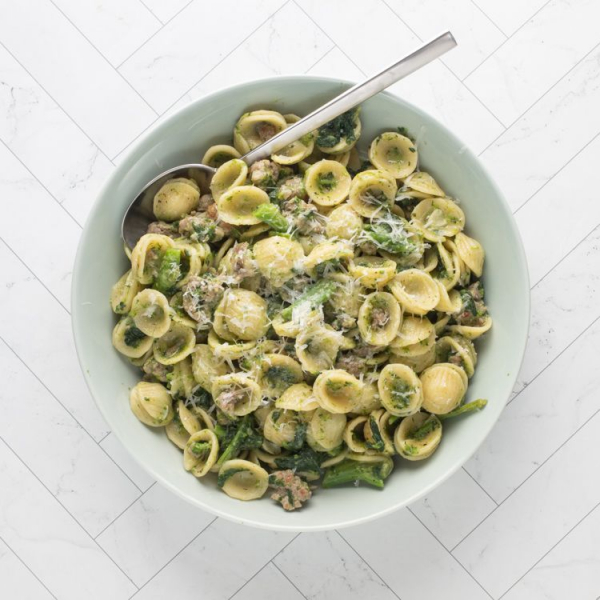
A Note From Our Recipe Tester
Ingredients
-
Salt
-
8 ounces sweet Italian sausage, casing removed
-
2 tablespoons olive oil
-
3 cloves garlic, thinly sliced
-
1 pinch red chile flakes
-
1 bunch (12 to 14 ounces) broccoli rabe, tough ends trimmed, cut into 1 1/2 inch pieces
-
12 ounces (3 1/2 cups) dry orecchiette pasta
-
1/2 cup freshly grated Pecorino Romano cheese
-
Freshly ground black pepper
Steps to Make It
-
Gather the ingredients.
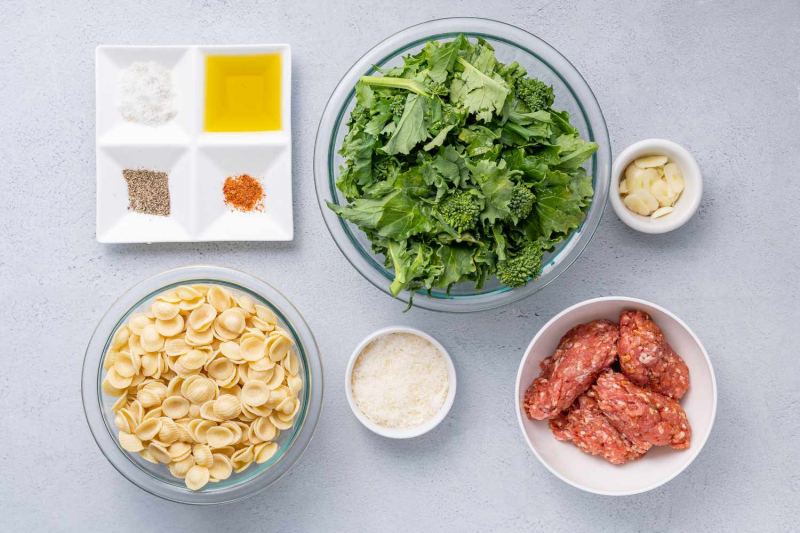
-
Bring a large pot of well-salted water to a boil.
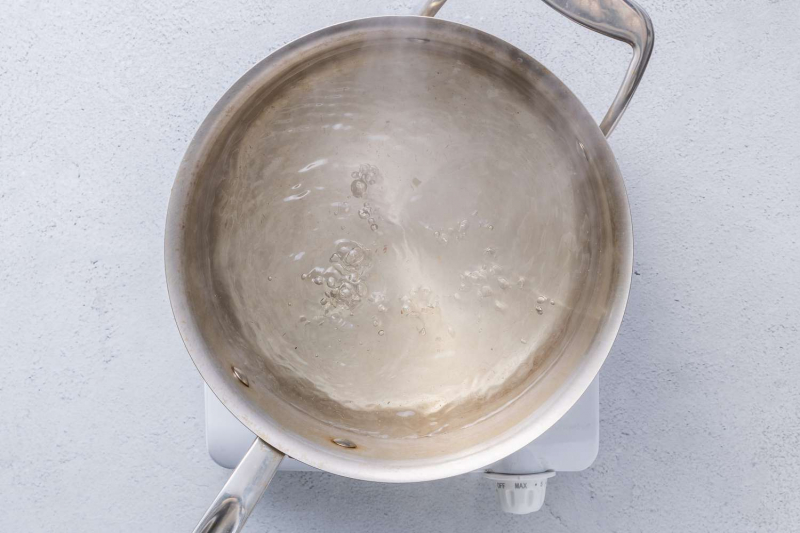
-
Meanwhile, break the sausage up into small pieces. Add the oil to a large skillet over medium heat. When the oil shimmers, add the sausage to the pan and cook, undisturbed, until the browned on one side, about 4 minutes.
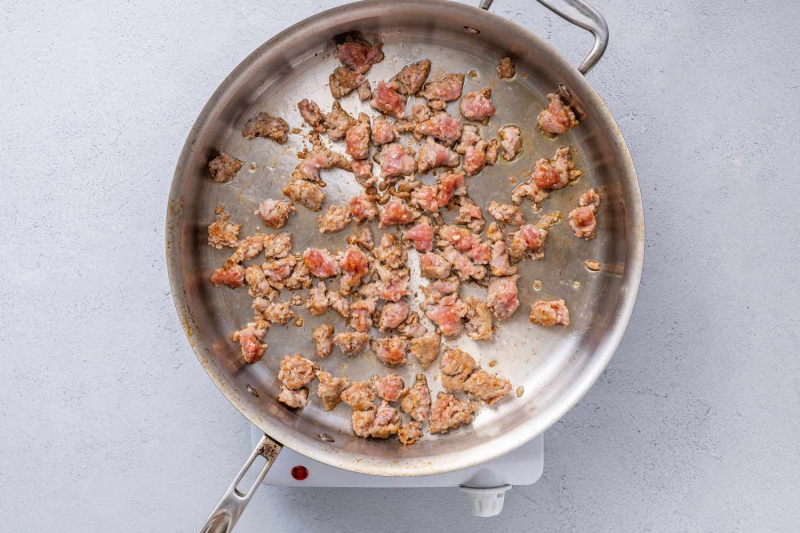
-
Reduce heat to low. Add garlic and chile flakes and cook, stirring frequently until fragrant, about 1 minute. Cover and remove from the heat.
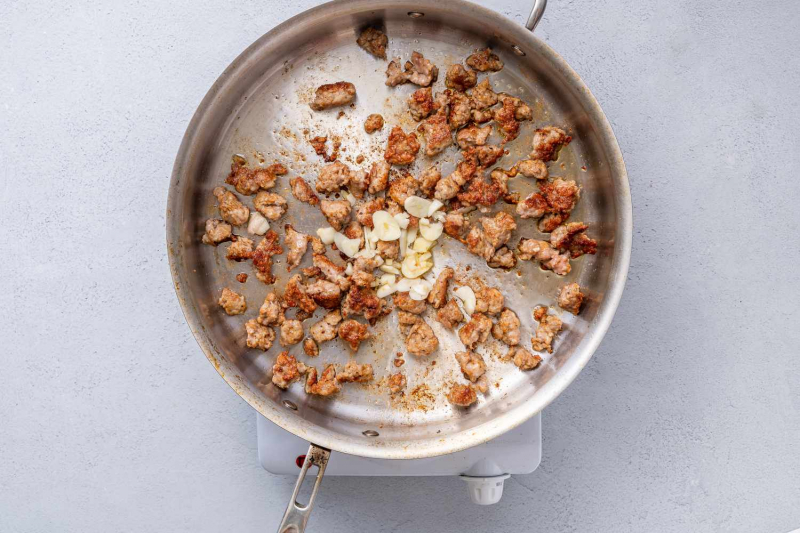
-
Add the broccoli rabe to the boiling water and cook, stirring frequently, until the leaves have wilted and stalks are crisp-tender, about 3 minutes.
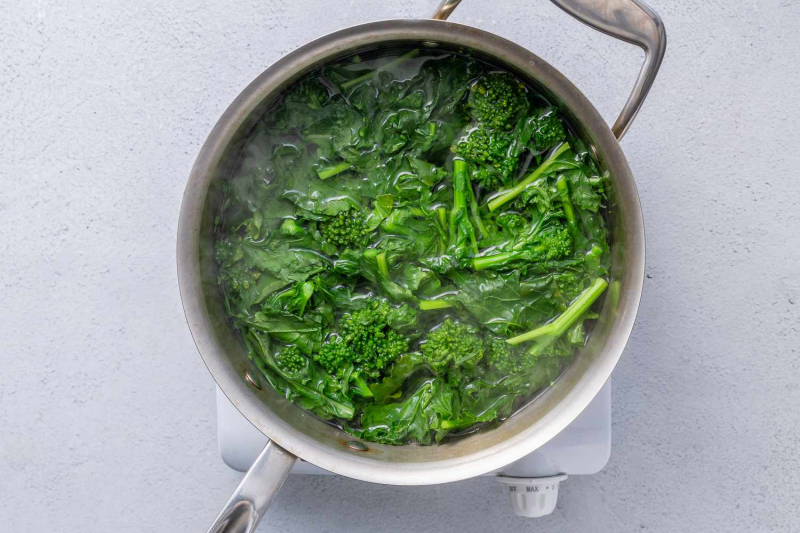
-
Use a small sieve or tongs to scoop the broccoli rabe out of the water. (Some bits of rabe will remain in the water, that’s fine.) Drain the broccoli rabe in a colander and rinse with cold water until cool enough to handle.
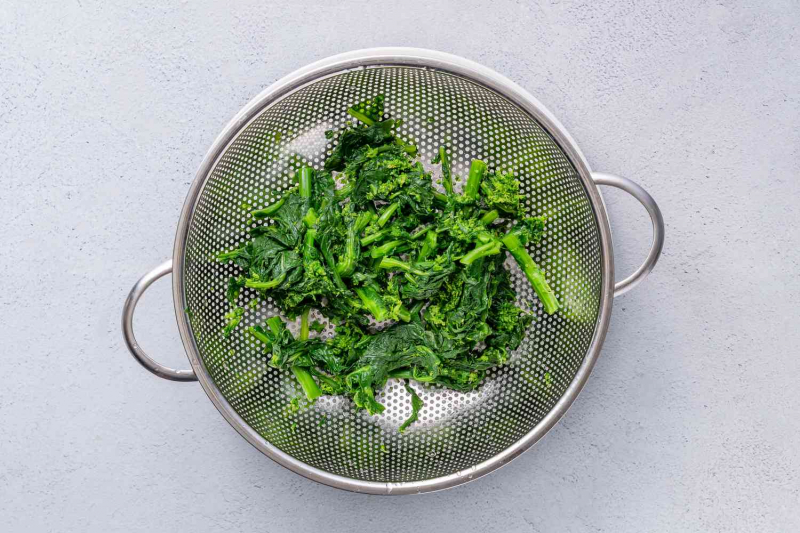
-
Squeeze the broccoli rabe dry and add it to the pan with the sausage mixture. Cover the pan and set it over low heat.
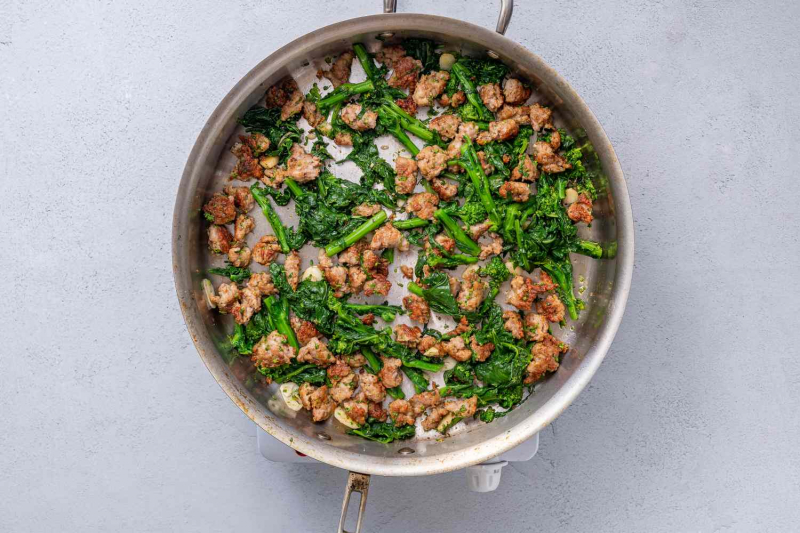
-
Return the water to a boil and add the pasta. Cook until al dente. Drain, reserving 3/4 cup of the cooking water.
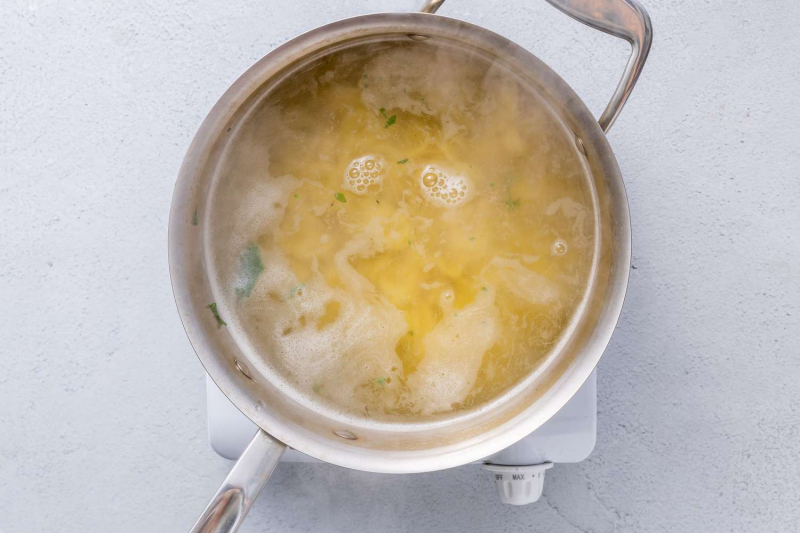
-
Add the drained pasta to the sausage mixture. Gradually stir in enough reserved pasta water to lightly coat the pasta. Stir in the cheese, season to taste with salt and pepper. Serve immediately.
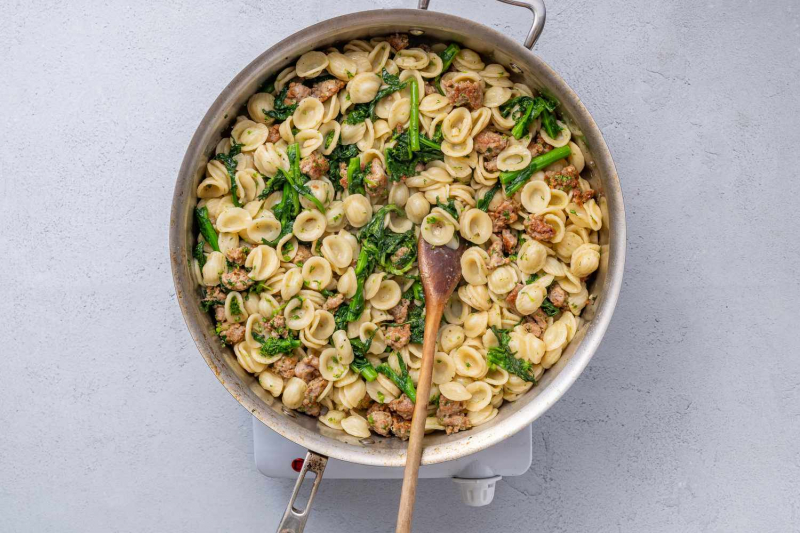
Recipe Tips
- If the stalks of the broccoli rabe are thicker than a pencil they tend to be tough. Either finely chop them or trim and discard the thickest stalks, if desired.
- Make sure to squeeze the broccoli rabe well after blanching so it’s not soggy in the finished dish.
Recipe Variations
- Use broccolini or young turnip greens if you can’t find broccoli rabe.
- Other short pasta like medium shells, cavatelli, or gnocchetti (the dry pasta, not to be confused with the potato-based dumpling) can be used in place of the orecchiette.
- For a heartier dish, use 1 pound of Italian sausage.
- Replace the Italian sausage with turkey or chicken sausage.
- If you don’t have Pecorino Romano cheese, consider Parmigiano-Reggiano or a good quality Parmesan cheese.
How to Store
- Leftovers can be stored in an airtight container in the refrigerator for up to 3 days. Reheat in a skillet over low heat or microwave until heated through, adding a splash of water to loosen the sauce, if desired.
- To freeze, transfer the pasta to an airtight container or freezer bag and freeze it for up to 3 months. Defrost the pasta in the fridge overnight.
Make Ahead
The broccoli rabe can be blanched, squeezed dry, and kept in an airtight container in the refrigerator for up to 2 days. Add to the pan with the sausage in step 7, adding a few minutes cooking time to reheat the rabe fully.
What is the difference between broccoli rabe and broccolini?
Broccoli rabe is a cruciferous vegetable. Despite its name, broccoli rabe does not taste like broccoli. The stalks, leaves, and florets are all eaten, and the flavor is somewhat bitter, like mustard or turnip greens.
Broccolini is a hybrid vegetable—a cross between broccoli and Chinese broccoli. Broccolini has thinner stalks than broccoli and the flavor is milder and slightly sweet.
| Nutrition Facts | |
|---|---|
| Servings: 4 | |
| Amount per serving | |
| Calories | 343 |
| % Daily Value* | |
| Total Fat 16g | 20% |
| Saturated Fat 5g | 23% |
| Cholesterol 27mg | 9% |
| Sodium 579mg | 25% |
| Total Carbohydrate 31g | 11% |
| Dietary Fiber 4g | 15% |
| Total Sugars 1g | |
| Protein 21g | |
| Vitamin C 21mg | 104% |
| Calcium 239mg | 18% |
| Iron 4mg | 23% |
| Potassium 362mg | 8% |
| *The % Daily Value (DV) tells you how much a nutrient in a food serving contributes to a daily diet. 2,000 calories a day is used for general nutrition advice. | |